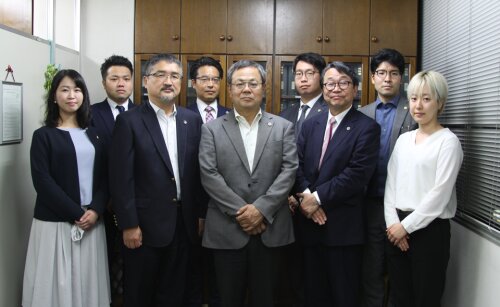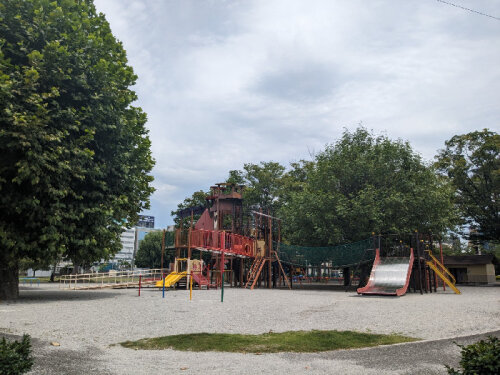Best Marriage Lawyers in Shizuoka
Share your needs with us, get contacted by law firms.
Free. Takes 2 min.
Free Guide to Hiring a Family Lawyer
List of the best lawyers in Shizuoka, Japan
About Marriage Law in Shizuoka, Japan
Marriage in Japan is a civil act that becomes legally effective when a marriage notification - konin todoke - is submitted and accepted by a municipal office. Shizuoka residents follow the same national rules that apply across Japan, with local municipal offices in each city, town, and village handling registration and issuing official records. Key legal concepts include the family register - koseki - for Japanese nationals, common surname rules, legal minimum age requirements, and the procedures that apply to international marriages and divorces. A ceremonial wedding or religious ceremony has no legal effect unless the konin todoke is filed with the municipality that has jurisdiction over the couple.
Why You May Need a Lawyer
Many everyday marriages proceed without legal help, but a lawyer is often necessary when disputes or legal complications arise. Common reasons to consult a family-law attorney in Shizuoka include contested divorces, complex property division, disputes over child custody or visitation, international marriage or divorce involving foreign law, child abduction or cross-border custody issues, domestic violence and protection orders, inheritance claims after a spouse dies, drafting or reviewing prenuptial or postnuptial agreements, and when administrative or registration problems occur at a municipal office or with immigration authorities. Lawyers can advise on strategy, prepare and submit legal documents, represent clients in family court mediation and litigation, and help secure enforceable judgments for support, custody, and property division.
Local Laws Overview
Legal minimum age - The legal minimum age to marry in Japan is 18 for both parties. Both parties must meet capacity requirements and provide required documentation.
Marriage registration - To become legally married in Japan you must submit a konin todoke to the municipal office of the city, town, or village where either spouse has a registered address. The form needs signatures or seals of two adult witnesses and required identity documents.
Family register - When a Japanese national marries, the event is recorded in the koseki. The koseki is a central legal record that affects name changes, inheritance, and other family-law matters.
Surnames - Japanese law requires that a married couple use a common family name on the koseki. Couples may choose which surname to adopt. Rules for name changes for foreign spouses depend on each person’s home-country law and the registration they complete in Japan.
Same-sex relationships - Same-sex marriage is not legally recognized under national Japanese law. Some municipalities across Japan issue partnership or solidarity certificates that provide limited local recognition and administrative benefits. Check the local Shizuoka municipal office about any available partnership systems.
Divorce - Divorce can be completed by mutual agreement and notification to the municipal office, or by family court procedures if contested. Key issues at divorce include property division, spousal support, child custody and support, and residence rights. Japanese family court commonly resolves disputed matters through mediation before trial.
Child custody and support - Japan applies a sole-custody system after divorce in most cases, meaning one parent is legally designated as the child’s guardian. Child support obligations are statutory and enforceable, but enforcement often requires family court orders or court judgments.
Domestic violence and protection - The Act on the Prevention of Spousal Violence and the Protection of Victims provides for protection orders and support measures for victims of domestic violence. Local police, municipal welfare offices, and support centers can assist; lawyers help obtain and enforce protective measures.
International issues - International marriages involve additional documents such as certificates of no impediment, authenticated translations, and possible registration with a foreign embassy or consulate. Marriage in Japan does not automatically change immigration status - a separate application is required for spouse visas.
Frequently Asked Questions
How do I legally get married in Shizuoka?
You and your partner must submit a completed marriage notification - konin todoke - to the municipal office where either of you is registered. The form requires the couple’s information and signatures or seals of two adult witnesses. Bring identification such as residence cards, passports, and for Japanese nationals the family register - koseki - if required by the office. Once the office accepts the record, the marriage is legally effective.
Do we need a ceremony for the marriage to be valid?
No. A wedding ceremony or religious service does not make a marriage legally valid in Japan. Only the registered konin todoke accepted by the municipal office creates a legal marriage.
What documents do foreign nationals need to marry in Shizuoka?
Requirements vary by country. Typical documents include passports, residence cards, birth certificates, and a certificate of no impediment or a statement from your embassy confirming you are free to marry. Some documents must be translated and notarized. Check with the municipal office and your embassy or consulate for exact requirements.
Does marriage change my immigration status automatically?
No. Marriage to a Japanese national or to a foreign resident does not automatically grant residency or change immigration status. You must apply to the Immigration Services Agency for an appropriate visa or change of status. A family-law attorney or immigration specialist can advise on preparing a spouse visa application.
Can I keep my original family name after marriage?
Under Japanese law, married couples must use a common surname on the family register - koseki - when at least one spouse is a Japanese national. Couples choose which surname to adopt. How a foreign spouse’s name is recorded for their home-country documents depends on that country’s rules. Legal advice can clarify options and effects on passports and identity documents.
What are the options if we want a prenuptial agreement?
Prenuptial and postnuptial agreements are permitted in Japan and can govern property and financial arrangements between spouses. They cannot override mandatory statutory protections such as children’s inheritance rights. Having an attorney draft or review the agreement and using clear, properly executed documents increases enforceability.
How is property divided at divorce?
Japan applies a principle of equitable division for marital property. Property acquired during the marriage is generally subject to division, while separate property owned before marriage or received as inheritance may be excluded. Spouses often negotiate settlement agreements; if parties cannot agree, the family court will determine division and may order payment or transfer of assets.
Who gets custody of the children after divorce?
Japanese practice typically results in one parent being awarded sole parental authority after divorce. Custody disputes are resolved through agreement, family court mediation, or court decision. Arrangements for visitation and child support should be settled in writing and, where possible, formalized by family court orders to ensure enforceability.
What should I do if I am experiencing domestic violence?
If you are in immediate danger, call the police. For legal protection contact the municipal consultation services, domestic violence support centers, or a family-law attorney. The Act on the Prevention of Spousal Violence and the Protection of Victims provides for protection orders and emergency measures. A lawyer can help obtain orders, secure shelter arrangements, and pursue related civil remedies such as custody and support.
How do I contest a marriage registration or seek annulment?
Contesting a marriage or seeking annulment involves specific legal grounds, such as lack of consent or mistaken identity. Remedies depend on the facts and may require action in family court. If you believe a marriage registration is invalid or was made by fraud or coercion, consult a family-law attorney promptly to protect your rights and to file appropriate legal actions.
Additional Resources
Municipal offices in Shizuoka - city, town, and village offices handle marriage registration and can provide checklists and required forms for konin todoke and certificates.
Family Court - The family court handles divorce disputes, custody, mediation, and related family-law matters. Contact the family court branch that covers your municipality for procedure details.
Shizuoka Bar Association - For lawyer referrals and information about free or low-cost legal consultations available locally.
Child consultation centers and domestic violence support offices - Local welfare offices and child guidance centers provide protection and support services for children and victims of domestic violence.
Ministry of Foreign Affairs and your country’s embassy or consulate - For requirements related to international marriage, certificates, and guidance on registering your marriage abroad.
Immigration Services Agency of Japan - For information on spouse visas and residency procedures following marriage.
Next Steps
1. Gather documents - Collect passports, residence cards, birth certificates, koseki extract for Japanese nationals, previous divorce or death certificates if applicable, and any embassy-issued certificates required for foreign nationals. Have certified translations ready if the municipal office requires them.
2. Visit your municipal office - Confirm the exact requirements and submit the konin todoke where one of you is registered. Ask about local procedures for witnesses and whether a seal - hanko - is needed.
3. Seek legal advice early in complex situations - If your case involves divorce disputes, custody, domestic violence, international issues, or significant assets, contact a qualified family-law attorney in Shizuoka for an initial consultation. The Shizuoka Bar Association can provide referrals and information about free consultation services.
4. Use mediation and alternative dispute resolution when appropriate - Family court mediation can resolve many divorce and custody issues without a full trial. A lawyer can represent you in mediation and help evaluate settlement offers.
5. Prepare for enforcement - If you need court orders for support, custody, or property division, your lawyer can help you obtain enforceable judgments and explain enforcement mechanisms.
If you are unsure where to start, schedule a consultation with a local family-law lawyer or visit your municipal office to request the marriage registration checklist. Taking these steps early will clarify your rights and help you resolve legal issues efficiently and with the appropriate local support.
Lawzana helps you find the best lawyers and law firms in Shizuoka through a curated and pre-screened list of qualified legal professionals. Our platform offers rankings and detailed profiles of attorneys and law firms, allowing you to compare based on practice areas, including Marriage, experience, and client feedback.
Each profile includes a description of the firm's areas of practice, client reviews, team members and partners, year of establishment, spoken languages, office locations, contact information, social media presence, and any published articles or resources. Most firms on our platform speak English and are experienced in both local and international legal matters.
Get a quote from top-rated law firms in Shizuoka, Japan — quickly, securely, and without unnecessary hassle.
Disclaimer:
The information provided on this page is for general informational purposes only and does not constitute legal advice. While we strive to ensure the accuracy and relevance of the content, legal information may change over time, and interpretations of the law can vary. You should always consult with a qualified legal professional for advice specific to your situation.
We disclaim all liability for actions taken or not taken based on the content of this page. If you believe any information is incorrect or outdated, please contact us, and we will review and update it where appropriate.









